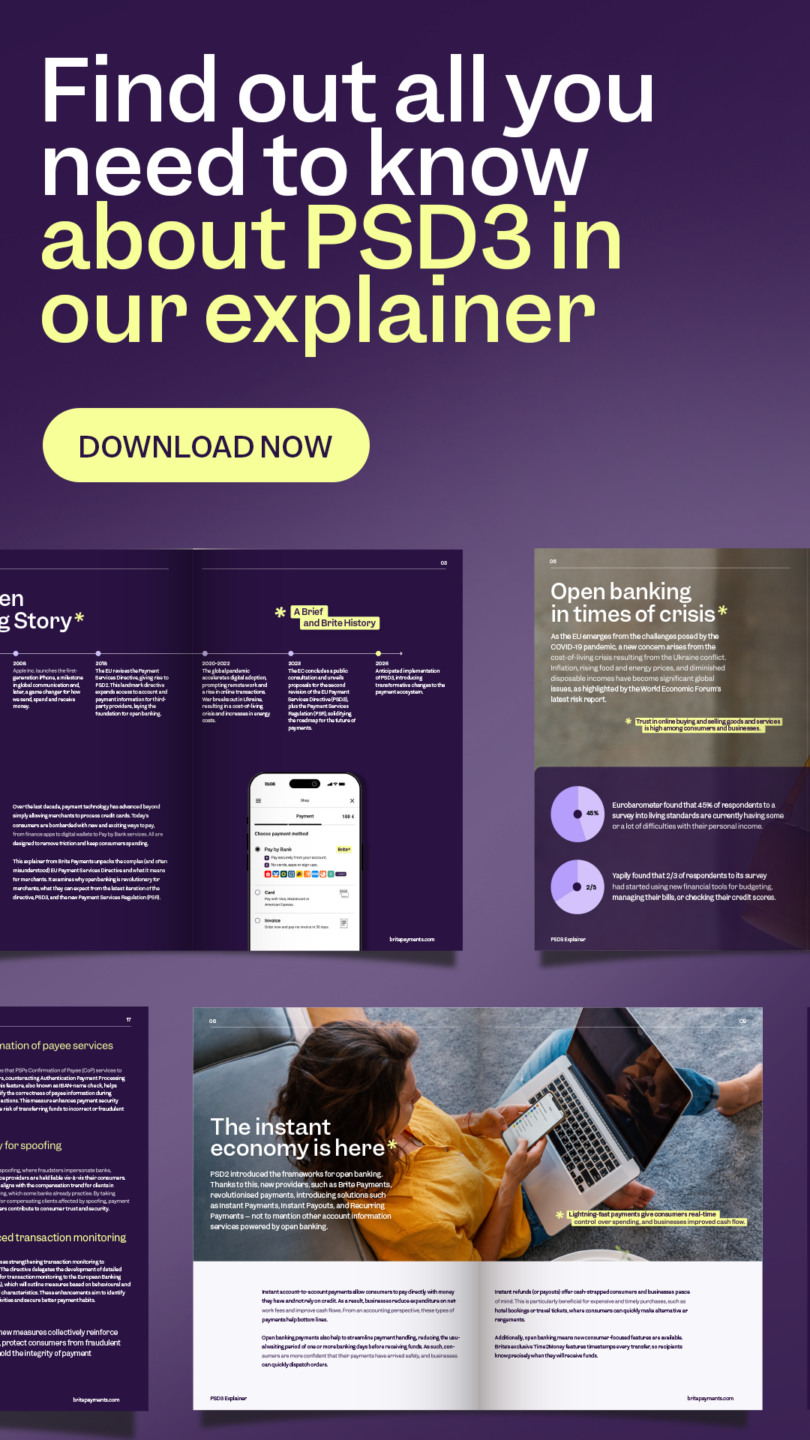Have you ever had a payment rejected because your bank account had a foreign IBAN? This practice is known as IBAN discrimination. It’s not just frustrating: it’s illegal under EU law.
So why does IBAN discrimination continue – and what can you do if your IBAN isn’t accepted?
In this article, we’ll cover what IBAN discrimination is, why it happens, and how PSD3 will help stop IBAN discrimination.
What is an IBAN?
Firstly, (for those who don’t know or won’t admit they don’t know) IBAN stands for International Bank Account Number. Every bank account has its own unique number that helps ensure payments are processed correctly.
An IBAN consists of up to 34 letters and numbers and follows a specific format. For example, in the UK, an IBAN consists of 22 digits and might look like this: GB15 ABCD 102030 12345678
Broken down, it includes the following information:
- GB (country code – 2 letters)
- 15 (check digits for error detection – 2 digits)
- ABCD (bank identifier – 4 characters)
- 102030 (bank branch sort code – 6 digits)
- 12345678 (individual account number – 8 digits)
What is IBAN discrimination?
IBAN discrimination occurs when a business, bank, or payment provider refuses to accept an IBAN from another European Economic Area (EEA) country even though EU regulations require it to.
IBAN discrimination particularly impacts:
- Expats and remote workers: Many people working across borders have bank accounts in different countries across the Single Euro Payments Area (SEPA).
- Freelancers and small businesses: Users of digital banks may face payment refusals from clients or platforms that won’t process non-local IBANs.
- Companies expanding across Europe: Businesses trying to centralise payments across multiple SEPA countries can struggle with suppliers and customers rejecting foreign IBANs.
Is IBAN discrimination legal?
IBAN discrimination is illegal under EU law. The SEPA Regulation (EU 260/2012) states that all IBANs from SEPA countries must be treated equally for euro payments.
This means that businesses, banks, and payment service providers cannot refuse a valid IBAN simply because it’s from another SEPA country.
The SEPA regulation aims to create a seamless, standardised payment system across Europe and reduce barriers to cross-border transactions.
Despite this, IBAN discrimination still happens. There’s a wide range of reasons for this, which we will touch on next.
Why does IBAN discrimination happen?
The most common reasons for IBAN discrimination include:
- Lack of awareness and/or compliance: Many businesses – especially small and medium-sized enterprises (SMEs) aren’t fully aware of SEPA regulations or don’t realise that refusing a foreign IBAN is illegal. Discrimination can also happen if staff aren’t properly trained on IBAN acceptance rules.
- Legacy systems and outdated infrastructure: Some banks and payment providers still use legacy systems configured to recognise only domestic IBANs. These outdated systems may not properly support cross-border IBANs, leading to automatic rejections.
- Internal policies and risk management: Due to perceived risks, fraud concerns, or compliance issues, some companies implement internal policies restricting IBANs from other countries – e.g. insisting on domestic IBANs to simplify payroll processing.
- Preference for domestic banking networks: Some businesses and institutions prefer using local banks and account numbers to reduce perceived administrative burdens. This is often the case with direct debits – companies may assume that a foreign IBAN makes it harder to handle payments or refunds.
- Resistance to fintech and digital banks: People using digital banks often face IBAN discrimination because these banks issue IBANs from a different country than the customer’s residence. Some companies mistakenly believe these IBANs aren’t valid for local transactions.
- Poor enforcement of SEPA rules: Even though IBAN discrimination is illegal, enforcement varies across EU countries. Some national authorities take complaints seriously and fine non-compliant companies. Others fail to act, allowing the problem to persist.
Despite clear regulations against IBAN discrimination, these issues persist. This makes it all the more important for consumers and businesses to challenge IBAN discrimination and report violations when they experience it.
How will PSD3 help stop IBAN discrimination?
PSD3 (Payment Services Directive 3) is expected to help combat IBAN discrimination by strengthening enforcement mechanisms and improving compliance with SEPA rules.
Here’s how:
- Stronger enforcement and penalties: IBAN discrimination is already illegal under PSD2. Still, enforcement varies across EU countries, and many businesses ignore the rules. PSD3 aims to introduce stricter penalties and better oversight, making it harder for companies to reject foreign IBANs without consequences.
- Increased consumer protection: PSD3 is expected to introduce clearer consumer rights regarding payment acceptance, making it easier for both individuals and businesses to challenge IBAN discrimination. National regulators may also be required to take faster action when complaints are filed.
- Improved cross-border payments: PSD3 will push for improved payment infrastructure and interoperability, ensuring SEPA payments are processed seamlessly – regardless of IBAN origin.
- More accountability for payment service providers: PSD3 is likely to introduce stricter rules on the handling of cross-border payments, making it harder for banks and payment providers to block or delay transactions from non-domestic IBANs.
- Digital and fintech inclusion: Many IBAN discrimination cases involve digital banks that provide IBANs from countries different from the customer’s residence. PSD3 is expected to strengthen the position of fintech companies and ensure their IBANs are treated equally.
Once PSD3 is properly implemented and enforced, it should significantly reduce IBAN discrimination by making penalties for non-compliance stricter, speeding up the complaint resolution process, ensuring businesses and banks update their payment systems, and giving consumers stronger legal backing when reporting discrimination.
Want to learn more about the benefits of open banking?
If you would like to know more about how payments such as Brite Instant Payments help prevent IBAN discrimination and are ready to comply with the new PSD3 regulations, then get in touch with one of our payment experts. To learn more about PSD3, click the link below to read our explainer guide.





